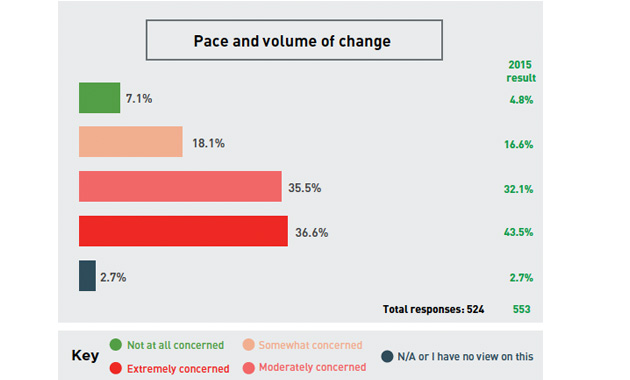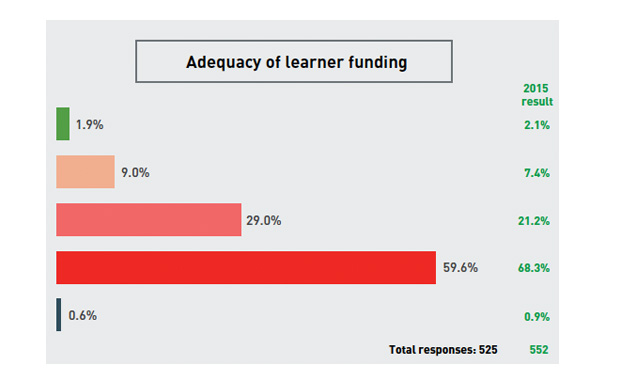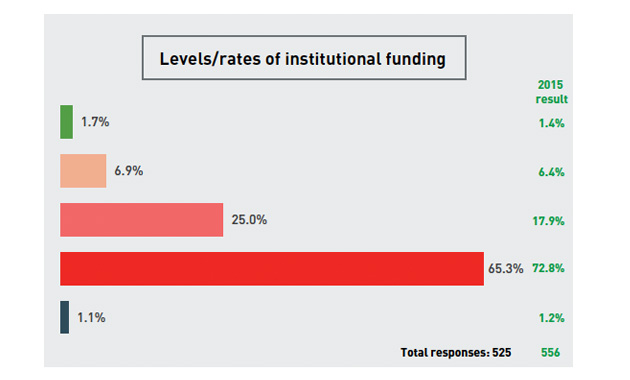Funding shortfalls remain the top concern among those involved in the FE sector in 2016.
Chancellor George Osborne’s u-turn on planned cuts in his November autumn statement failed to allay anxieties throughout the sector.
If the government had hoped for at least a few Brownie points, ministers forgot the age-old law of politics —it’s not what they don’t do that matters, it’s what they do.
And previously-agreed spending cuts at record levels are now hitting hard.
Ministers might have won more support had they been seen as both more caring and more competent, with a better grasp and understanding of the issues.
Indeed, the third FE and Skills annual survey carried out by the Policy Consortium in association with FE Week shows considerable support for policy commitments towards better apprenticeships, devolution of powers and responsibilities, a clearer focus on skills and improved partnership working.
But such support is undermined by a perceived lack of clarity on funding and confused or poorly-implemented policy.
The whole question of devolution and how the government is going about area reviews is cause for ‘extreme concern’.
The whole question of devolution and how the government is going about area reviews is cause for ‘extreme concern’.
Additionally, apprenticeships are seen as the only thing minsters now really care about, with little regard for wider FE learner needs, particularly for the disadvantaged.
External bureaucracy is the fourth biggest issue on a list of almost 90 areas of concern expressed in the survey — making a mockery of government’s much-vaunted ‘bonfire of the quangos’ and claims to slash red tape and paperwork.
Again, the survey shows a stark contrast, with colleges and other training providers reducing their own internal bureaucratic burdens, only to be swamped with demands from government agencies.
The profile of more than 730 people responding to the survey is heavyweight — mainly comprising leaders and managers, with a strong showing from admin support staff, lecturers and trainers.
Eight out of ten are full-time employees and over half have been in the sector for at least 13 years.
These are very experienced people with a strong commitment to the sector, therefore, and with around half involved in frontline delivery.
Funding was the chief cause for concern in the first survey carried out in 2014 but it had slipped down the list last year, to be topped by workload and bureaucracy.
However, this was not because colleges and other providers had overcome their worries.
Rather, it was because the impact of the cuts caused even greater concerns around the practical issues of learning, curriculum and management.
The survey has taken the same format each year, in order to assess any year-onyear changes in the patterns of concerns, attitudes and responses to government policy.
This year, however, we included an additional question with new elements around the role, power and status of the sector, to reflect changing context as policy evolves after last spring’s general election result.
The government needs to take heed if it is to regain the sector’s respect and confidence.
Three-quarters of respondents at every level felt uncertain about the sector’s role and value in the emerging post-reform world.
Roughly the same proportion were moderately or extremely concerned about their power to influence change and the impact of devolution.
We included a new question this year, asking what issues people were optimistic about.
Among FE and skills professionals, that feeling remains in short measure, not least because of constant denigration of their efforts by Ofsted.
Over half of the respondents took advantage of this opportunity, but their responses were often phrased along the lines of: “I would be optimistic if it wasn’t for…”
The most positive remarks from respondents are around the capacity of the workforce to deliver and hopes for learners.
But, set against this, there is a feeling that FE is being run down — and that what matters to so many current and potential learners doesn’t matter to the government.
The best that can be said from these survey results in relation to ministerial hopes and expectations for the FE and Skills sector is that there is agreement with some aspects of policy, but that the architecture is flawed and the government needs to do something about it quickly.
The final report will be available — free to whoever wants a copy — in mid-June.
Click here for FE Week news coverage of the survey results.





Your thoughts